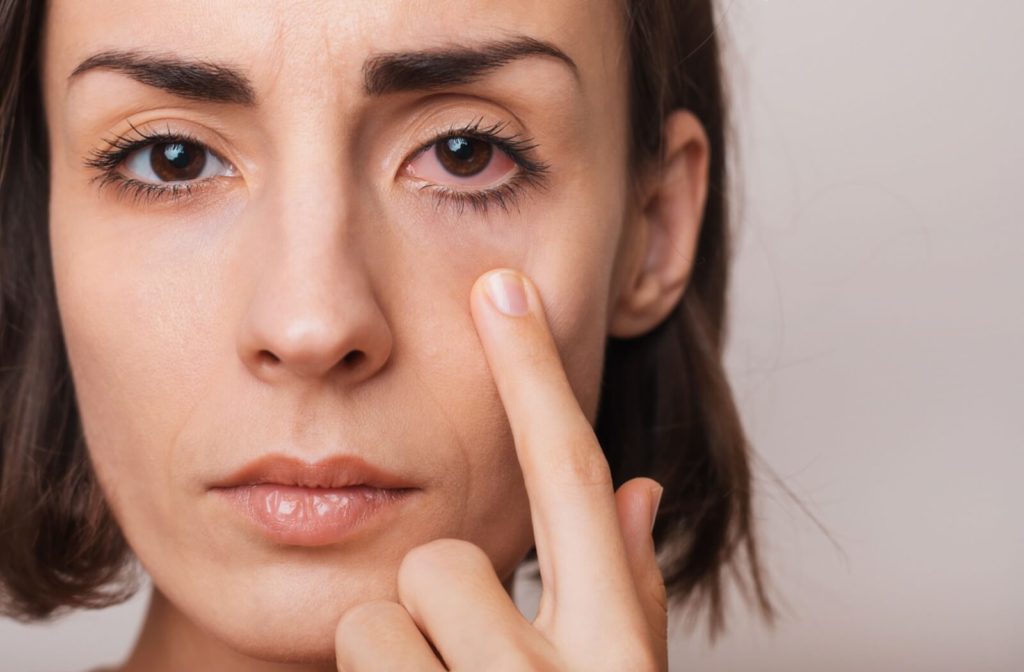Maintaining good eye health plays a key role in healthy vision. Yet, eye infections can easily disrupt this balance by causing irritation and discomfort.
In an ideal world, we’d never get sick. However, through certain precautions, we can prevent eye infections, manage the spread, encourage healing, and prevent recurring infections by:
- Maintaining good hygiene
- protecting our eyes
- Maintaining overall eye health
Understanding Eye Infections
Eye infections are like an uninvited guest. They can sneak into our lives at the most inconvenient times.
Our tears are like natural defenses against uninvited guests, like harmful debris. However, infection can still occur when these defenses are compromised or overwhelmed.
These infections develop when harmful microorganisms invade the eye or surrounding tissue, leading to red, irritated, and watery eyes–hallmark signs of infection–creating a profound urge to rub them for temporary relief, which is strongly discouraged.
Not all eye infections are the same. They vary in their onset, have overlapping symptoms, and target different parts of the eye, uniquely impacting ocular health. These differences mean their approach to treatment will also vary.
We can sense the onset of an infection because it occurs suddenly, usually after exposure to pathogens.
Symptoms of infections generally include:
- Pain
- Redness
- Swelling
- Discharge
- Watery eyes
- Blurry vision
Infections can result from various factors, including exposure to pathogens, poor hygiene, or underlying health conditions, including:
- Contact with contaminated surfaces or objects.
- Poor contact lens hygiene.
- Viral infections.
- Allergies that irritate the eyes.
- Compromised immune system.
Many eye infections are highly contagious, especially ones caused by pathogens like viruses and bacteria. The infection spreads quickly and easily through direct contact with others or touching contaminated surfaces and then the eyes.
Treating eye infections is vital to prevent complications, mitigate the spread to others, and prevent recurring infections.
Common Eye Infections
Given the variety of infections, visiting an optometrist is key.
Their thorough evaluation allows for an accurate diagnosis of the infection, determines the underlying cause, and a treatment plan tailored to a patient’s unique needs.
No matter how mild the infection may seem, visiting your optometrist is strongly suggested for timely intervention. Delaying treatment can lead to severe complications like corneal damage or even vision loss.
- Blepharitis: This occurs when bacteria, certain skin conditions, or blocked oil glands inflame the eyelids. It’s not contagious but requires consistent eyelid hygiene using wipes and warm compresses for management.
- Conjunctivitis: Also known as pink eye, this occurs when the conjunctiva becomes inflamed by irritants like bacteria, viruses, or allergens. Its viral and bacterial strains are highly contagious.
- Keratitis: Caused by inflammation of the cornea by pathogens like bacteria or viruses, each requiring a specific course of treatment. Contact lens wearers are particularly susceptible to this infection.
- A stye: This is a small, painful bump on the eyelid caused by a bacterial infection of the oil gland. It can be transferred to another person through direct contact with the infected area or sharing personal items.

Preventing Eye Infections
Preventing eye infections helps minimize the risk of recurring infections and mitigate the spread. In the event of an infection, certain precautions help mitigate the spread, promote healing, and prevent recurring infections.
If you’re prescribed any medication, complete the entire course of treatment, even if symptoms improve. This prevents residual bacteria from causing reinfection.
Continue to maintain thorough hygiene by washing your hands and avoiding touching or rubbing your eyes.
For contact lens wearers, avoid wearing lenses until the infection has cleared, open up a fresh pack of lenses, and if necessary, get a new storage container.
Discard any makeup products that might have become contaminated and sanitize or replace hygiene items such as pillowcases or towels.
Maintain Good Hygiene
Practicing good hygiene is a fundamental step in preventing eye infections:
- Wash your hands: Regularly washing your hands with soap and water is one of the most crucial steps in preventing the spread of bacteria and viruses. Our hands often come into contact with germs that can easily transfer to the eyes.
- Avoid touching your eyes: Avoid unnecessarily touching your eyes to reduce the risk of introducing irritants. If you must touch your eyes, make sure to thoroughly wash your hands.
- Maintain proper contact lens care: Contact lens wearers must stick to strict lens hygiene and follow the scheduled wear time of the lenses. This means cleaning the lenses with saline solution, replacing the lenses and storage case, and avoiding sleeping or showering in lenses to prevent infections like keratitis.
- Avoid sharing personal items: Never share items that come into contact with your eyes, like makeup, glasses, contacts, or towels. Bacteria and viruses can easily spread through shared items.
- Practice proper eyelid hygiene: Regularly clean the eyelids and along the lashline with an eyelid wipe and use a warm compress to prevent conditions like blepharitis and styes.
Protect Your Eyes
Take steps to protect your eyes from potential irritants or allergens which can help prevent infections.
Wear sunglasses to shield your eyes from UV rays and dust particles. If you work in environments with potential eye hazards, wear safety glasses to create a barrier from irritants like dust or metal.
If allergens cause eye irritation and itching, manage your allergies using medications or by removing the allergen (if possible).
If you’ve been exposed to allergens or irritants, avoid rubbing your eyes to prevent further irritation or inflammation and potential infections.
Maintain Overall Eye Health
A well-functioning immune system, supported by a healthy lifestyle, can help combat pathogens that cause infections more effectively.
Eating a balanced diet rich in nutrients like vitamin A and Omega-3 fatty acids helps maintain the eye tissues and reduces the risk of eye conditions.
This includes managing chronic conditions that can impact eye irritation like allergies or certain skin conditions to maintain healthy eyelids.
Schedule a Visit
Visiting your optometrist when you feel the onset of an eye infection helps prevent the spread and recurring infections.
Connect with our team at Rancho Santa Margarita Optometry to schedule an appointment.


